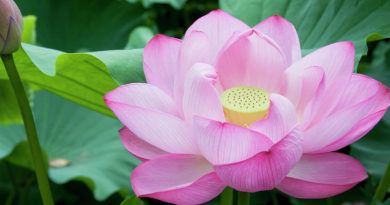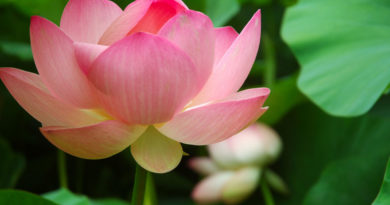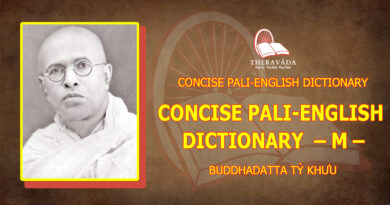Concise Pali-english Dictionary – D –
– D –
daka : [nt.] water.
dakarakkhasa : [m.] a water-sprite.
dakkha : [adj.] clever; able; skilled; dexterous.
dakkhaka : [adj.] one who see.
dakkhatā : [f.] skill; ability; cleverness.
dakkhati : [dis + a; dis is changed to dakkh),] sees.
dakkhiṇa : [adj.] southern; right (side).
dakkhiṇa akkhaka : [nt.] the right collar-bone.
dakkhiṇaakkhaka : [nt.] the right collar-bone.
dakkhiṇadisā : [f.] the south.
dakkhiṇadesa : [m.] the southern country.
dakkhiṇanāvatta : [adj.] winding to the right.
dakkhiṇanodaka : [nt.] water of dedication.
dakkhiṇāpatha : [m.] the southern route (in India); the country in the south, now called Dekkan.
dakkhiṇāyana : [nt.] the southern course of the sun.
dakkhiṇāraha : [adj.] worthy of a dedicatory gift.
dakkhiṇāvatta : [adj.] winding to the right.
dakkhiṇāvisuddhi : [f.] purity of a gift.
dakkhiṇeyya : [adj.] worthy of an offering.
dakkhiṇeyyapuggala : [m.] an individual deserving a donation.
dakkhiṇodana : [nt.] water of dedication.
dakkhitāye : [inf. of dakkhati] to see.
dakkhituṃ : [inf. of dakkhati] to see.
dakkhinī : [m.] one who sees or perceives.
dakkhī : [m.] one who sees or perceives.
daṭṭha : [pp. of ḍasati] bitten.
daṭṭhaṭṭhāna : [nt.] the place where one is bitter.
daḍḍha : [pp. of ḍahati] burnt; set fire to. (pp. of dahati), burnt, consumed by fire.
daḍḍhageha : [adj.] one whose house is burnt.
daḍḍhaṭṭhāna : [nt.] the place burn by fire.
daṇḍa : [m.] 1. a stem, stick, cudgel, walking stick, timber (in general), 2. a fine, punishment.
daṇḍaka : [nt.] a stick, twig, rod, a handle.
daṇḍakamadhu : [nt.] a bee-hive hanged on a branch.
daṇḍakamma : [nt.] punishment, penalty; atonement.
daṇḍakoṭi : [f.] the tip of a stick.
daṇḍadīpikā : [f.] a torch.
daṇḍanīya : [adj.] liable to punishment.
daṇḍaparāyana : [adj.] leaning on a stick; supported by a staff.
daṇḍapāṇī : [adj.] carrying a staff in one’s hand.
daṇḍappatta : [adj.] one who is prosecuted.
daṇḍabhaya : [nt.] fear of punishment.
daṇḍahattha : [adj.] one who has a stick in hand.
daṇḍika : [adj.] having a stick.
datta : [pp. of dadāti] given.
datti : [f.] a small vessel to keep food in.
dattika : [adj.] (in cpds.) given by.
dattiya : [adj.] (in cpds.) given by.
dattu : [m.] stupid person.
datthabhava : [m.] the fact of being bitten.
datvā : [abs. of dadāti] having given.
dada : [m.] (in cpds.) giving; bestowing.
dadanta : [pr.p. of dadāti] giving; offering; allowing; granting; handing over.
dadamāna : [pr.p. of dadāti] giving; offering; allowing; granting; handing over.
dadāti : [dā + a; dā is doubled and the former ā is shortened] gives; offers; allows; grants; hands over.
dadi : [aor. of dadāti] gave; offered; allowed; granted; handed over.
dadituṃ : [inf. of dadāti] to give; to offer; to allow; to grant; to hand over.
daditvā : [abs. of dadāti] having given.
daddu : [f.] a kind of cutaneous eruption.
daddula : [nt.] a soft skeleton similar to a sponge.
dadhi : [nt.] curds.
dadhighaṭa : [m.] a pot of curds.
dadhimaṇḍa : [nt.] whey.
danta : [pp. of dameti] tamed; trained; mastered; converted. (nt.), a tooth; tusk; fang. (pp. of dameti), tamed, controlled; restrained
dantakaṭṭha : [nt.] a tooth brush; tooth-cleaner.
dantakāra : [m.] an artisan in ivory.
dantapanti : [f.] row of tooth.
dantapoṇa : [m.] tooth-bangle.
dantabhāva : [m.] tameness; control; state of being restrained.
dantavalaya : [nt.] an ivory bangle
dantavidaṅsaka : [adj.] showing one’s teeth.
dantasaṭha : [m.] limes tree. (nt.) lime fruit.
dantāvaraṇa : [(danta + āvaraṇa), nt.] the lip.
dandha : [adj.] slow; silly; stupid.
dandhatā : [f.] stupidity; sluggishness.
dappa : [m.] arrogance; wantonness.
dappaṇa : [nt.] a mirror; looking glass.
dappita : [adj.] arrogant; haughty.
dabba : [adj.] wise; able. (nt.) timber; wealth; substance.
dabbajātika : [adj.] intelligent.
dabbasambhāra : [m.] a collection of wood-work or building material.
dabbimukha : [m.] a kind of bird; Turdus Ginginianus.
dabbī : [f.] a spoon; ladle.
dabbha : [m.] kusa-grass.
dabbhamukha : [m.] a kind of bird; Turdus Ginginianus.
dama : [m.] taming; subjugation; restraint; mastery.
damaka : [adj.] tamer, controller; trainer.
damatha : [m.] taming; subjugation; restraint; mastery.
damana : [nt.] taming; subjugation; restraint; mastery.
damanīya : [pt.p. of dameti] should be tamed; should be trained; should be mastered; shoul be converted.
damita : [pp. of dameti] tamed; trained; mastered; converted.
damiḷa : [adj.] Tamil.
dametabha : [pt.p. of dameti] should be tamed; should be trained; should be mastered; shoul be converted.
dameti : [dam + e] tames; trains; masters; converts.
dametu : [adj.] tamer, controller; trainer.
dametvā : [abs. of dameti] having tamed; having trained; having mastered; having converted.
damenta : [pr.p. of dameti] taming; training; mastering; converting.
damesi : [aor. of dameti] tamed; trained; mastered; converted.
dampati : [m.] wife and husband.
damma : [adj.] tamed or trained.
dayā : [f.] sympathy; compassion; kindness.
dayālu : [adj.] kind; compassionate.
dayita : [pp.] being sympathised.
dara : [m.] sorrow; anxiety; distress.
daratha : [m.] sorrow; anxiety; distress.
darī : [f.] a cleavage; cleft; cavern.
dala : [nt.] a blade; leaf; petal.
daḷidda : [adj.] poor; needy; a poor person.
daḷha : [adj.] firm; strong; steady.
daḷhaṃ : [adv.] firmly; strongly.
daḷhaparakkama : [adj.] of strong effort; energetic.
daḷhīkamma : [nt.] strengthening; making firm.
daḷhīkaraṇa : [nt.] strengthening; making firm.
dava : [m.] play; sport.
davakamyatā : [f.] fondness of joking.
davaḍāha : [m.] forest fire.
davatthāya : [dat. sing.] for fun.
davāya : [dat. sing.] for fun.
dasa : (in cpds.), one who sees. (adj.), ten.
dasaka : [nt.] a decade; a group of ten.
dasakkhattuṃ : [adv.] ten times.
dasadhā : [adv.] in ten ways.
dasana : [nt.] tooth.
dasanacchada : [m.] the lip.
dasabala : [adj.] endowed with ten supernormal powers, the Buddha.
dasavidha : [adj.] tenfold.
dasasata : [nt.] a thousand.
dasasatanayana : [adj.] having one thousand eyes. i.e. the Sakka.
dasasahassa : [nt.] ten-thousand.
dasikasutta : [nt.] a loose thread of fringe.
dassaka : [adj.] one who shows.
dassati : [fut. of dadāti] (he) will give.
dassana : [nt.] sight; intuition; insight.
dassanīya : [adj.] fair to behold; beautiful; handsome.
dassaneyya : [adj.] fair to behold; beautiful; handsome.
dassāvī : [m.] one who sees. Only in cpds. such as bhayadassāvī.
dassita : [pp. of dasseti] shown; exhibited.
dassiya : [abs. of dasseti] having shown; having exhibited.
dassī : [m.] one who sees. Only in cpds. such as bhayadassāvī.
dassu : [m.] robber.
dasseti : [dis + e; dis is changed to das] shows; exhibits.
dassetu : [m.] one who point out or shows.
dassetvā : [abs. of dasseti] having shown; having exhibited.
dassenta : [pr.p. of dasseti] showing; exhibiting.
dassesi : [aor. of dasseti] showed; exhibited.
daha : [m.] like.
dahati : [dah + a] burns; accepts.
dahana : [nt.] burning. (m.) fire.
dahara : [adj.] young in years. (m.) a boy.
dahi : [aor. of dahati] burnt; accepted.
dāṭhā : [f.] a fang; the canine tooth.
dāṭhādhātu : [f.] the tooth relic (of the Buddha).
dāṭhābalī : [adj.] one whose strength lies in his tusks.
dāṭhāvudha : [adj.] using tusks as his weapon.
dāḍima : [nt.] pomegranate.
dātabba : [pt.p. of dadāti] fit to be given.
dātu : [m.] giver; a generous person.
dātuṃ : [inf. of dadāti] to give; to offer; to allow; to grant; to hand over.
dāna : [nt.] gift; charity; alms; alms-giving.
dānakathā : [f.] talk about charity.
dānagga : [nt.] a place where alms are given.
dānanāraha : [adj.] worthy of receiving gifts.
dānapati : [m.] master in liberality.
dānaphala : [nt.] the fruit of munificence.
dānamaya : [adj.] consisting of giving alms.
dānava : [m.] a Titan.
dānavaṭṭa : [nt.] constant giving of alms.
dānavatthu : [nt.] things to be given.
dānaveyyāṭika : [adj.] a distributor of alms or one who serves in feeding.
dānasālā : [f.] alms-hall.
dānasīla : [adj.] fond of giving.
dānasoṇḍa : [adj.] of liberal disposition.
dānāraha : [adj.] worthy of receiving gifts.
dāni : [adv.] now.
dāpana : [nt.] inducement to give.
dāpita : [pp. of dāpeti] induced to give.
dāpeti : [caus. of deti] induces to give.
dāpetu : [m.] one who induces to give.
dāpetvā : [abs. of dāpeti] having induced to give.
dāpenta : [pr.p. of dāpeti] inducing to give.
dāpesi : [aor. of dāpeti] induced to give.
dāyaka : [m.] giver; supporter.
dāyajja : [nt.] inheritance. (adj.) One who inherits.
dāyati : [dā + ya] mows; reaps.
dāyana : [m.] mowing.
dāyapāla : [m.] a grove-keeper.
dāyāda : [m.] inheritance. (adj.) (in cpds.) inheriting.
dāyādaka : [adj.] one who inherits.
dāyi : [aor. of dāyati] mowed; reaped.
dāyikā : [f.] a female donor.
dāraka : [m.] a boy; youngster.
dārabharaṇa : [nt.] maintenance of a wife.
dārikā : [f.] a girl.
dārita : [pp. of dāreti] split; burst open.
dāru : [nt.] wood; timber; fire-wood.
dārukkhandha : [m.] a log of wood.
dārukhaṇḍa : [nt.] a pieces of wood.
dāruṇa : [adj.] severe; harsh; cruel.
dārubhaṇḍha : [nt.] furniture; wooden articles.
dārumaya : [adj.] made of wood.
dārusaṅghāṭa : [m.] a raft made of wood.
dāreti : [dāl + e] splits; bursts open.
dāretvā : [abs. of dāreti] having split; having burst open.
dārenta : [pr.p. of dāreti] spliting ; bursting open.
dāresi : [aor. of dāreti] split; burst open.
dālana : [nt.] splitting.
dālayamāna : [pr.p. of dāleti] see dāreti.
dālita : [pp. of dāleti] see dāreti.
dāleti : [dāl + e] see dāreti.
dāletvā : [abs. of dāleti] see dāreti.
dālenta : [pr.p. of dāleti] see dāreti.
dālesi : [aor. of dāleti] see dāreti.
dāḷiddiya : [nt.] poverty.
dāḷima : [nt.] pomegranate.
dāvaggi : [m.] forest-fire.
dāsagaṇa : [m.] a group of slaves.
dāsatta : [nt.] slavery; the condition of a slave.
dāsavya : [nt.] slavery; the condition of a slave.
dāsitta : [nt.] status of a female slave.
dāsī : [f.] a female slave.
dikkhati : [dis + a] 1. sees; 2. becomes a monk.
dikkhita : [pp. of dikkhati] initiated; consecrated.
digambara : [m.] a naked ascetic.
diguṇa : [adj.] twofold, double.
digghikā : [f.] a ditch.
dija : [m.] 1. a brahman; a twice born; 2. a bird.
dijagaṇa : [m.] a group of brahmans or birds.
diṭṭha : [pp. of passati] seen; found; understood. (nt.), vision.
diṭṭhadhamma : [m.] this world. (adj.) one who has realised the final truth.
diṭṭhadhammika : [adj.] belonging to this world.
diṭṭhamaṅgalika : [adj.] one who believes in auspicious things seen.
diṭṭhasansadana : [nt.] to compare one’s view on things seen or known.
diṭṭhānugati : [(diṭṭha + anugati) f.] imitation of what one sees.
diṭṭhi : [f.] dogma; theory; belief.
diṭṭhika : [adj.] (in cpds.), believing in; having the theory of.
diṭṭhikantāra : [m.] the wilderness of dogma.
diṭṭhigata : [nt.] a belief; wrong view.
diṭṭhigahana : [nt.] the thicket of speculation.
diṭṭhijāla : [nt.] the net of sophistry.
diṭṭhivipatti : [f.] failure in theory.
diṭṭhivipallāsa : [m.] contortion of views.
diṭṭhivisuddhi : [f.] clear vision; right understanding.
diṭṭhisaṃyojana : [nt.] the fetter of empty speculation.
diṭṭhisaṅyojana : [nt.] the fetter of empty speculation.
diṭṭhisampanna : [adj.] endowed with right view.
ditta : [pp. of dippati] blazed; shone.
ditti : [f.] light; brightness.
diddha : [adj.] smeared with; poisoned.
dina : [nt.] day.
dinakara : [m.] the sun.
dinaccaya : [m.] exhaustion of the day; evening.
dinapati : [m.] the sun.
dinādāyī : [dina + ādāyīadj.] taking what is given.
dindibha : [m.] a lap-wing.
dinna : [pp. of deti] given; granted. (pp. of dadāti), given; offered; allowed; granted; handed over.
dinnaka : [m.] an adopted son. (nt.) the thing given.
dinnādāyī : [(dinna + ādāyī) adj.] taking what is given.
dipacci : [f.] flame of a lamp.
dipada : [m.] a biped; a man.
dipadinda : [m.] the most noble of the bipeds i.e. the Enlightened One.
dipaduttama : [m.] the most noble of the bipeds i.e. the Enlightened One.
dippati : [dip + ya] shines.
dippana : [nt.] shining.
dippi : [aor. of dippati] shone.
dibba : [adj.] divine; celestial.
dibbacakkhu : [nt.] the divine eye.
dibbacakkhuka : [adj.] endowed with the superhuman eye.
dibbati : [div + ya] sports; amuses oneself.
dibbavihāra : [m.] the supreme condition of heart.
dibbasampatti : [f.] heavenly bless.
dibbi : [aor. of dibbati] sported; amused oneself.
diyaḍḍha : [m.] one and a half.
diva : [m.] heaven.
divasa : [m.] day.
divasakara : [m.] the sun.
divasabhāga : [m.] daytime.
divākara : [m.] the sun.
divāṭhāna : [nt.] place where the daytime is spent.
divāvihāra : [m.] rest during the heat.
divāseyyā : [f.] laying on at midday; siesta.
diviya : [adj.] divine; celestial. (see dibba).
divya : [adj.] divine; celestial. (see dibba).
disa : [m.] enemy.
disampati : [m.] king.
disākāka : [m.] a crow kept on board a ship in order to search land.
disākusala : [adj.] one who knows the directions.
disāpāmokkha : [adj.] world-famed.
disābhāga : [m.] a direction.
disāmūḷha : [adj.] one has lost his bearings.
disāvāsika : [adj.] living in another country or in different parts of country.
disāvāsī : [adj.] living in another country or in different parts of country.
disvā : [abs. of passati] having seen; having found; having understood.
dissati : [dis + ya] seems; appears.
dissanta : [pr.p. of dissati] seeming; appearing.
dissamāna : [pr.p. of dissati] seeming; appearing; visible.
dīgahajātika : [m.] a being of the snake kind.
dīgha : [adj.] long.
dīghaṅguli : [adj.] having long fingers.
dīghajātika : [m.] a being of the snake kind.
dīghatā : [f.] length.
dīghatta : [nt.] length.
dīghadassī : [adj.] far-seeing.
dīghanikāya : [m.] the collection of long suttas.
dīghabhāṇaka : [m.] a repeater or expounder of the Dīghanikāya.
dīgharattaṃ : [adv.] a long time.
dīghalomaka : [adj.] having long fleece.
dīghavaṇṭa : [m.] the tree Oroflylum indicum.
dīghasottiya : [nt.] long sleep; sluggishness.
dīdhiti : [f.] light; radiance.
dīnatā : [f.] wretchedness.
dīnatta : [nt.] wretchedness.
dīpa : [m.] 1. a lamp; 2. an island; 3. help; support.
dīpaka : [nt.] a small island. (adj.) shawing; explaining.
dīpaṅkara : [adj.] one who lights a lamp; name of the former Buddha.
dīpanā : [f.] illustration; explanation.
dīpanī : [f.] an explanatory work.
dīpayamāna : [pr.p. of dīpeti] lighting; making clear; explaining.
dīparukha : [m.] a lamp post.
dīpasikhā : [f.] flame of a lamp.
dīpāloka : [(dīpa + āloka) m.] light of a lamp.
dīpi : [m.] a panther.
dīpika : [m.] a panther.
dīpita : [pp. of dīpeti] illustrated; explained; shown; made clear; explained.
dīpinī : [f.] female panther.
dīpeta : [pr.p. of dīpeti] lighting; making clear; explaining.
dīpetabba : [pt.p. of dīpeti] should be lighted; should be made clear; should be explained.
dīpeti : [dip + e] light; make clear; explain.
dīpetvā : [abs. of dīpeti] having lighted; having make clear; having explained.
dīpenta : [pr.p. of dīpeti] lighting; making clear; explaining.
dīpesi : [aor. of dīpeti] lighted; made clear; explained.
du : antithetic prefix implying badness, perverseness, and difficulty.
duka : [nt] a dyad; a pair.
dukūla : [nt.] a kind of very fine cloth.
dukkata : [adj.] badly done. (nt.) wrong action.
dukkara : [adj.] difficult to do.
dukkaratā : [f.] difficulty.
dukkaratta : [nt.] difficulty.
dukkarabhāva : [m.] difficulty.
dukkha : [nt.] suffering; pain; misery; agony; discomfort.
dukkhaanubhavana : [nt.] unpleasant of punishment.
dukkhaṃ : [adv.] with difficulty.
dukkhakkhanda : [m.] aggregate of suffering.
dukkhakkhaya : [m.] extinction of misery.
dukkhanidāna : [nt.] source of misery. (adj.) causing pain.
dukkhanirodha : [m.] destruction of suffering.
dukkhanirodhagāminī : [f.] (the practice) leading to the extinction of suffering.
dukkhapaṭikkūla : [adj.] averse to pain.
dukkhapareta : [adj.] afflicted by misery.
dukkhapita : [pp. of dukkhāpeti] afflicted; caused pain; hurt.
dukkhapetvā : [abs. of dukkhāpeti] havig afflicted; having caused pain; having hurt.
dukkhapenta : [pr.p. of dukkhāpeti] afflicting; causing pain; hurting.
dukkhappatta : [adj.] being in pain.
dukkhappahāṇa : [nt.] removal of misery.
dukkhavipāka : [adj.] having pain as its fruit; creating misery.
dukkhasacca : [nt.] the truth of misery.
dukkhasamudaya : [m.] the origin of suffering.
dukkhasamphassa : [adj.] having an unpleasant touch.
dukkhaseyyā : [f.] an uncomfortable sleep.
dukkhānubhavana : [(dukkha + anubhava) nt.] undergoing of punishment.
dukkhāntagū : [(dukkha + antagū) m.] one who has conquered suffering.
dukkhāpagama : [(dukkha + apagama) m.] removal of pain.
dukkhāpana : [nt.] hurting.
dukkhāpeti : [deno. from dukkha] afflicts; causes pain; hurts.
dukkhāpesi : [pp. of dukkhāpeti] afflicted; caused pain; hurt.
dukkhita : [adj.] afflicted; grieved; unhappy; dejected; ailing. (pp. of dukkhīyati), felt pain; was distressed.
dukkhī : [adj.] afflicted; grieved; unhappy; dejected; ailing.
dukkhīyati : [deno. from dukkha] feel pain; be distressed. aor. dukkhīyi. pp. ḍukkhita
dukkhīyi : [aor. of dukkhīyati] felt pain; was distressed. aor. dukkhīyi. pp. ḍukkhita
dukkhudraya : [adj.] causing pain, resulting in ill.
dukkhūpasama : [m] alleviation of suffering.
dukkhesi : [aor. of dukkhāpeti] afflicted; caused pain; hurt.
dukkhotiṇṇa : [adj.] fallen into misery.
dugga : [nt.] a place difficult to access; a fortress.
duggata : [adj.] poor; miserable.
duggati : [f.] a realm of miserable existence.
dugganda : [adj.] having a bad smell. (m.) a bad smell.
duggandha : [m.] bad smell.
duggama : [adj.] difficult to go.
duggahita : [adj.] held or taken wrongly. (nt.) a wrong action.
duccaja : [adj.] difficult to leave or given up.
duccarita : [nt.] bad conduct; wrong action.
dujivha : [m.] a serpent.
dujjaha : [adj.] difficult to give or remove.
dujjāna : [adj.] difficult to know.
dujjīvita : [nt.] wrong livelihood.
duṭṭha : [pp. of dussati] offended against; become corrupted or angry. (adj.), spoilt; corrupt; wicked; bad.
duṭṭhacitta : [nt.] evil-minded; malignant.
duṭṭhu : [adv.] badly.
duṭṭhulla : [nt.] lewd talk. (adj.) inferior.
dutappaya : [adj.] not easily satiable.
dutiya : [adj.] second; having as the second.
dutiyaṃ : [adv.] for the second time.
dutiyaka : [adj.] a companion.
dutī : [f.] a messenger; envoy.
duttara : [adj.] difficult to cross over.
duddama : [adj.] difficult to manage or tame.
duddasa : [adj.] difficult to see or understand.
duddasatara : [adj.] more difficult to see.
duddasāpanna : [adj.] come misfortune.
duddasika : [adj.] having ugly features.
duddina : [nt.] a cloudy or unlucky day.
duddha : [pp. of duhati] milked. (nt.), milk.
dundubhi : [nt.] drum.
dunnāmaka : [nt.] piles; haemorrhoids.
dunnikkhitta : [adj.] badly or wrongly placed.
dunniggaha : [adj.] difficult to subdue or control.
dunnimitta : [nt.] bad omen.
dunnīta : [adj.] wrongly carried or applied.
dupaṭṭa : [adj.] having two folds.
duppañña : [adj.] foolish. (m.) a fool.
duppaṭinissaggiya : [adj.] difficult to give up or abstain from.
duppaṭivijjha : [adj.] difficult to understand.
duppamuñca : [adj.] difficult to be freed.
dupparihāriya : [adj.] difficult to use or manage.
duphassa : [m.] the nettle plant; disagreeable touch.
dubbaca : [adj.] obstinate; disobedient.
dubbaṇṇa : [adj.] of bad colour; discoloured; ugly.
dubbala : [adj.] feeble; weak.
dubbalatā : [f] feebleness.
dubbalatta : [nt.] feebleness.
dubbalabhāva : [m.] feebleness.
dubbalya : [n.] feebleness.
dubbā : [f.] panic grass.
dubbijāna : [adj.] difficult to understand.
dubbinīta : [adj.] obstinate; badly trained.
dubbuṭṭhika : [adj.] rainless. (nt.) a famine; scarcity of rain.
dubbhaka : [adj.] treacherous; insidious person.
dubbhati : [dubh + a] is treacherous or unfaithful; plots against.
dubbhana : [nt.] treachery.
dubbhara : [adj.] difficult to bring up or speech.
dubbhāsita : [nt.] an insulting word; bad speech.
dubbhi : [aor. of dubbhaka] was treacherous or unfaithful; plotted against.
dubbhikkha : [nt.] a famine; scarcity of food.
dubbhitvā : [abs. of dubbhaka] having been treacherous or unfaithful; having plotted against.
duma : [m.] a tree.
dumagga : [nt.] tree-top.
dumantara : [nt.] variety of trees; interval of trees.
duminda : [(duma + inda), m.] the king of trees, i.e., the Bo-tree.
dumuttama : [(duma + uttama), m.] the king of trees; i.e., the Bo-tree.
dumuppala : [m.] a tree producing yellow flowers. see kaṇikāra.
dummaṅku : [adj.] one who is difficult to make silent; obstinate person.
dummatī : [m.] an evil-minded person; a fool.
dummana : [adj.] unhappy; sorrowful.
dummukha : [adj.] having a sad face.
dummedha : [adj.] foolish.
duyhati : [pass. of duhati] is milked.
duyhi : [aor. of duyhati] was milked.
durakkha : [adj.] difficult to protect.
durakkhāta : [pp.] badly preached.
duraccaya : [adj.] difficult to pass over.
duratikkama : [adj.] difficult to pass over.
duranubhodha : [adj.] difficult to know or understand.
durājāna : [adj.] difficult to know or understand.
durāsada : [adj.] difficult to be approached.
durita : [nt.] sin; bad action.
durutta : [adj.] badly spoken. (nt.) bad speech.
dulladdha : [adj.] obtained with difficulty.
dulladdhi : [f.] a wrong view.
dullabha : [adj.] rare; difficult to obtain.
duvaṅgika : [adj.] consisting of two portions.
duvidha : [adj.] twofold.
duve : [(nom. plu. of dvi)] two; two person or things.
dussa : [nt.] cloth.
dussakaraṇḍaka : [m.] clothes-chest.
dussakoṭṭhāgāra : [nt.] a store-room for clothes.
dussati : [dus + ya] offends against; becomes corrupted or angry.
dussana : [nt.] offending; corruption; anger.
dussayuga : a suit of garments.
dussavaṭṭi : [f.] a foll of cloth; fringe of a cloth.
dussaha : [adj.] difficult to bear on.
dussi : [aor. of dussati] offended against; became corrupted or angry.
dussitvā : [abs. of dussati] having offended against; having become corrupted or angry.
dussīla : [adj.] of bad character; void of morality.
duha : [adj.] (in cpds.) milking; yielding; granting.
duhati : [duh + a] milks.
duhana : [nt.] milking.
duhamāna : [pr.p. of duhati] milking.
duhi : [aor. of duhati] milked.
duhitu : [f.] daughter.
duhitvā : [abs. of duhati] having milked.
dūta : [m.] a messenger; envoy.
dūteyya : [nt.] errand; commission; carrying of messages.
dūbhaka : [adj.] a treacherous person.
dūra : [adj.] distant; far. (nt.), distance.
dūraṅgama : [adj.] going afar.
dūrato : [inf.] from afar.
dūratta : [nt.] the fact of being distant.
dūsaka : [adj.] one who defiles or defames; corrupting; spoiling.
dūsana : [nt.] corruption; defilement.
dūsayamāna : [pr.p. of dūseti] 1. spoiling; polluting; 2. defaming; 3. ill-treating.
dūsita : [pp. of dūseti] 1. spoiled; polluted; 2. defamed; 3. ill-treated.
dūseti : [dus + e] spoils; pollutes; defames; ill-treats.
dūsetvā : [abs. of dūseti] 1. to spoil; to pollute; 2. to defame; 3. to ill-treat.
dūsenta : [pr.p. of dūseti] 1. spoiling; polluting; 2. defaming; 3. ill-treating.
dūsesi : [aor. of dūseti] 1. spoiled; polluted; 2. defamed; 3. ill-treated.
deḍḍubha : [m.] a water-snake.
deṇḍima : [m.] a kettle-drum.
deti : [dā + e] gives. (See dadāti).
denta : [pr.p. of deti] giving. (See dadāti).
deva : [m.] 1. a deity; 2. the sky; 3. a rain cloud; 4. a king.
devakaññā : [f.] a heavenly maiden.
devakāya : [m.] a group of gods.
devakumāra : [m.] a divine prince.
devakusuma : [nt.] cloves.
devagaṇa : [m.] a troop of gods.
devacārikā : [f.] a journey in heaven.
devaccharā : [f.] a nymph.
devaññatara : [adj.] an inferior deity.
devaṭṭhāna : [nt.] a temple dedicated to a deity.
devatā : [f.] a deity.
devatta : [nt.] divinity.
devattabhāva : [m.] divine condition or body.
devadattika : devadattiya adj. given by a deity.
devadāru : [m.] a kind of pine, Uvaria longifolia.
devadundubhi : [f.] thunder.
devadūta : [m.] gods’ messenger.
devadeva : [m.] the god of gods.
devadhamma : [m.] divine virtue; fear to sin.
devadhītu : [f.] a young nymph.
devanagara : [nt.] the city of the devas.
devanikāya : [adj.] a community of devas.
devaparisā : [f.] an assembly of devas.
devaputta : [m.] son of a god.
devapura : [nt.] the celestial city.
devabhavana : [nt.] abode of a deity.
devayāna : [nt.] the path to heaven; an air-ship.
devara : [m.] brother-in-law; husband’s brother.
devarāja : [m.] the king of devas.
devarukkha : [m.] a celestial tree.
devarūpa : [nt.] an image of a deity.
devaloka : [m.] heaven.
devavimāna : [adj.] heavenly mansion.
devasika : [adj.] occurring daily.
devasikaṃ : [adv.] daily.
devātideva : [m.] the god of gods.
devānubhāva : [m.] divine power.
deviddhi : [f.] divine power.
devisi : [m.] a divine seer.
devī : [f.] a goddess; a queen.
devūpapatti : [f.] rebirth among gods.
desa : [m.] region; country; a district.
desaka : [m.] a preacher; one who expounds.
desanā : [f.] discourse, sermon, preaching.
desanāvilāsa : [m.] beauty of instruction.
desika : [adj.] belonging to a country or province.
desita : [pp. ḍeseti] pointed out; preached; expounded.
deseti : [dis + e] points out; preaches; expounds.
desetu : [m.] a preacher; one who expounds.
desetvā : [abs.] having pointed out; having preached; having expounded.
desenta : [pr.p. deseti] pointing out; preaching; expounding.
desesi : [aor. of deseti] pointed out; preached; expounded.
dessa : [adj.] disagreeable; detestable; odious.
dessiya : [adj.] disagreeable; detestable; odious.
deha : [m. nt.] the body.
dehanikkhepana : [nt.] laying down the body; death.
dehanissita : [adj.] connected with or belonging to the body.
dehī : [m.] that which has a body; a creature.
doṇa : [m. nt.] a measure of capacity; 1/8th of a bushel.
doṇi : [f.] a boat; a canoe; a trough.
doṇikā : [f.] a boat; a canoe; a trough.
domanassa : [nt.] displeasure; melancholy; grief.
dolā : [f.] a swing; palanquin.
dolāyati : [deno. from dolā] swings; moves to and fro.
dolāyi : [aor. of dolāyati] swung; moved to and fro.
dovārika : [m.] gatekeeper.
dosa : [m.] anger; corrupting; defect; fault.
dosakkhāna : [nt.] blaming.
dosaggi : [m.] the fire of anger.
dosāpagata : [adj.] free from fault or defect.
dosāropaṇa : [nt.] blaming; finding fault.
dosinā : [f.] bright; moonlit.
dohaka : [m.] one who milks.
dohaḷa : [m.] longing of a pregnant woman; strong desire.
dohaḷinī : [f.] the woman who has some longing.
dohī : [adj.] 1. one who milks; 2. an ungrateful person.
dvaṅgula : [adj.] measuring two inches. (nt.) two inches.
dvattiṃsati : [f.] thirty-two.
dvattikkhattuṃ : [adv.] twice or thrice.
dvattipatta : [nt.] two or three bowls.
dvanda : [nt.] a pair; couple; dyad. (m.) the Collective Compound.
dvaya : [nt.] a pair; couple; dyad.
dvācattāḷīsati : [f.] forty-two.
dvādasa : [adj.] twelve.
dvānavuti : [f.] ninety-two.
dvāra : [nt.] door; entrance; gate.
dvārakavāṭa : [nt.] the shutter of a door; doors and windows.
dvārakoṭṭhaka : [nt.] the gateway; room over a gate.
dvāragāma : [m.] village outside the city-gates.
dvāraṭṭha : [m.] gate-man; gatekeeper.
dvārapāla : [m.] gate-man; gatekeeper.
dvārabāhā : [f.] door-post.
dvārasālā : [f.] a hall near the gate.
dvārika : [adj.] belonging to a gate. noun: a doorkeeper, m.
dvāvīsati : [f.] twenty-two.
dvāsaṭṭhi : [f.] sixty-two.
dvāsattati : [f.] seventy-two.
dvāsīti : [f.] eighty-two.
dvi : [adj.] two. (the numeral)
dvika : [nt.] a dyad; pair; couple.
dvikkhattuṃ : [adv.] twice.
dviguṇa : [adj.] twofold; double.
dvicattālīsati : [f.] forty-two.
dvija : [m.] a brahmin; a bird; a tooth; (twice-born).
dvijivha : [adj.] a serpent, (having two tongues).
dvidhā : [adv.] in two ways; in two parts.
dvidhāpatha : [m.] crossing of roads.
dvinavuti : [f.] ninety-two.
dvipa : [m.] an elephant.
dvipaññāsati : [f.] fifty-two.
dvipatha : [m.] crossing of roads.
dvimāsika : [adj.] two months old or existing two months.
dvisaṭṭhi : [f.] sixty-two.
dvisata : [nt.] two hundred.
dvisattati : [f.] seventy-two.
dvisahassa : [nt.] two-thousand.
dvītīhaṃ : [adv.] two or three days.
dvīha : [nt.] two days.
dve : [(nom. plu. of dvi)] the two.
dvejjha : [nt.] doubt; contradiction. (adj.) doubtful.
dvedhā : [adv.] in two ways; in two.
dvedhāpatha : [m.] a cross road.
dvepatha : [m.] a cross road.
dvebhāva : [m.] twofoldness.
dveḷhaka : [nt.] doubt.
dveḷhakajāta : [adj.] being in doubt.
dvevācika : [adj.] having only two words (to repeat).
dh
dhaṅka : [m.] a crow.
dhaja : [m.] a flag; emblem; symbol.
dhajagga : the top of a standard.
dhajālu : [adj.] adorned with flags.
dhajāhaṭa : [(dhaja + āhaṭa) adj.] captured in war; taken as a booty.
dhajinī : [f.] an army.
dhañña : [nt.] grain; corn. (adj.) fortunate; lucky.
dhaññaphala : [nt.] harvest.
dhaññarāsi : [m.] a heap of grain.
dhaññavantu : [adj.] fortunate; lucky.
dhaññāgāra : [dhañña + agāra] a granary.
dhata : [pp. of dhāreti] kept in mind; known by heart.
dhana : [nt.] wealth, riches.
dhanakkīta : [adj.] bought for money.
dhanakkhaya : [m.] exhaustion of wealth.
dhanatthaddha : [adj.] proud of wealth.
dhanatthika : [adj.] desiring wealth.
dhanalola : [adj.] greedy of wealth.
dhanavantu : [adj.] rich, wealthy.
dhanahetu : [adv.] for the sake of wealth.
dhanāyati : [deno. from dhana] considers something as one’s wealth.
dhanāsā : [(dhana + āsā) f.] craving for wealth.
dhanika : [m.] a creditor.
dhanita : [nt.] sound. (adj.), sounded; sonant (said of a letter).
dhanī : [adj.] wealthy. noun: wealthy person.
dhanu : [nt.] a bow.
dhanuka : [nt.] a small bow.
dhanukāra : [m.] bow-maker.
dhanuketakī : [m.] the screw-maker.
dhanuggaha : [m.] an archer.
dhanusippa : [nt.] the art of shooting.
dhanta : [pp. of dhamati] blown; sounded; kindled.
dhama : [adj. & n.] one who blows; a player (of a trumpet, etc.).
dhamaka : [adj. & n.] one who blows; a player (of a trumpet, etc.).
dhamakaraka : [m.] a filter or water-strainer. (often seen as dhammakaraka).
dhamati : [dham + a] blows; sounds; kindles.
dhamana : [ger. of dhamati] blowing; sounding; kindling.
dhamani : [f.] a vein.
dhamanisanthatagatta : [adj.] having veins showing all over the body (for lack of flesh).
dhamanta : [pr.p. of dhamati] blowing; sounding; kindling.
dhamāpeti : [caus. of dhameti] causes to blow; causes to sound.
dhami : [aor. of dhamati] blew; sounded; kindled.
dhamita : [pp. of dhameti] blown; sounded.
dhamitvā : [abs. of dhamati] having blown; having sounded; having kindled.
dhameti : [dham + e] blows; sounds.
dhamenta : [pr.p. of dhameti] blowing; sounding.
dhamesi : [aor. of dhameti] blew; sounded.
dhamma : [m.] doctrine; nature; truth; the Norm; morality; good conduct.
dhammakathā : [f.] religious talk; ethical discussion.
dhammakathika : [m.] one who preaches the Norm.
dhammakamma : [nt.] a legally valid act; procedure in accordance with Vinaya rules.
dhammakāma : [adj.] lover of the truth.
dhammakāya : [adj.] the Normal body.
dhammakkhandha : [m.] a portion of the Norm.
dhammakkhāna : [nt.] preaching of the doctrine.
dhammagaṇḍikā : [f.] the block of justice. i.e., of execution.
dhammagaru : [adj.] respecting the Norm.
dhammagutta : [adj.] protected by the Norm.
dhammaghosaka : [m.] one who announces about the preaching of the Norm.
dhammacakka : [nt.] the wheel of Norm.
dhammacakkappavattana : [nt.] preaching of the universal righteousness.
dhammacakkhu : [nt.] the eye of wisdom.
dhammacariyā : [f.] observance of righteousness.
dhammacārī : [m.] one who walks in the righteousness. (adj.) virtuous.
dhammacetiya : [nt.] a shrine in which sacred texts are enshrined.
dhammajīvī : [adj.] living righteously.
dhammaññū : [adj.] one who knows the doctrine.
dhammaṭṭha : [adj.] just; righteous.
dhammaṭṭhiti : [f.] the real nature of the Norm.
dhammatakka : [m.] right reasoning.
dhammatā : [f.] a general rule; nature.
dhammadāna : [nt.] the gift of the Norm.
dhammadāyāda : [adj.] having dhamma as one’s inheritance; spiritual heir.
dhammadīpa : [adj.] having the Norm as a sound footing.
dhammadesanā : [f.] exposition of the Norm.
dhammadessī : [m.] a hater of the Norm.
dhammadhaja : [adj.] having dhamma as one’s banner.
dhammadhara : [adj.] one who knows the Norm by heart.
dhammani : [m.] rat-snake.
dhammaniyāma : [m.] the order of the Norm.
dhammapaṇṇākāra : [m.] a present consisting of dhamma.
dhammapada : [nt.] a line or stanza of the Norm.
dhammappamāṇa : [adj.] measuring by the teaching.
dhammabhaṇḍāgārika : [m.] the treasurer of the Norm.
dhammabheri : [f.] the drum of the Norm.
dhammarakkhita : [adj.] protected by the Norm.
dhammarata : [adj.] fond of the Law.
dhammarati : [f.] delight in the Law.
dhammarasa : [m.] taste of the Norm.
dhammarāja : [m.] the king of righteousness.
dhammaladdha : [adj.] righteously acquired.
dhammavara : [m.] the excellent doctrine.
dhammavādī : [adj.] speaking according to the Law.
dhammavicaya : [m.] investigation of doctrine.
dhammavidū : [adj.] one who understands the Law.
dhammavinicchaya : [m.] righteous decision.
dhammavihārī : [adj.] living according to the Law.
dhammasaṃvibhāga : [m.] distribution of the Law.
dhammasaṅgāhaka : [m.] compiler of the scriptures.
dhammasaṅgīti : [f.] recital of sacred scriptures.
dhammasamādāna : [nt.] acquisition of the Norm.
dhammasaraṇa : [nt.] putting one’s faith on the Norm.
dhammasavaṇa : [nt.] hearing of the Norm.
dhammasākacchā : [f.] discussion about the Law.
dhammasālā : [f.] preaching hall.
dhammasenāpati : [m.] generalissimo of the Law.
dhammasoṇḍa : [adj.] fond of the Norm.
dhammassāmī : [m.] the lord of the Norm.
dhammādāsa : [(dhamma + ādāsa), m.] the mirror of the Norm.
dhammādhipati : [(dhamma + adhipati), adj.] respecting of Law as one’s guide.
dhammānudhamma : [(dhamma + anudhamma), m.] lawfulness; conformity with the Norm.
dhammānuvattī : [(dhamma + anuvattī), adj.] acting in conformity with the Law.
dhammānusārī : [(dhamma + anusārī), adj.] acting in conformity with the Law.
dhammābhisamaya : [(dhamma + abhisamaya), m.] understanding of the Truth.
dhammāmata : [(dhamma + amata), nt.] the nectar of the Norm.
dhammāsana : [(dhamma + āsana), nt.] a pulpit.
dhammika : [adj.] righteous.
dhammilla : [m.] a knot of hair; braided hair.
dhammīkathā : [f.] religious talk.
dhara : [adj.] (in cpds.) bearing; holding; keeping in mind; wearing.
dharaṇa : [nt.] a weight comprising about 2/5 of an ounce.
dharaṇī : [f.] the earth.
dharati : [dhar + a] lasts; continues; lives.
dharanta : [pr.p. of dharati] lasting; continuing; living.
dharamāna : [pr.p. of dharati] lasting; continuing; living.
dhari : [aor. of dharati] lasted; continued; lived.
dharuha : [m.] a tree.
dhava : [m.] husband; the acacia tree.
dhavala : [adj.] white; clean. (n.), white colour.
dhātī : [f.] a nurse; foster-mother.
dhātu : [f.] an element; natural condition; a relic; root of a word; humour of the body; faculty of senses.
dhātuka : [adj.] (in cpds.) having the nature of.
dhātukathā : [f.] an explanation about elements; the 3rd book of the Abhidhamma.
dhātukusala : skilled in the elements.
dhātughara : [nt.] a relic chamber.
dhātunānatta : [nt.] diversity of natures or elements.
dhātuvibhāga : [m.] separation of elements; distribution of relics.
dhāraka : [adj.] (in cpds.) bearing; holding; wearing.
dhārita : [pp. of dhāreti] borne; held; worn.
dhāreti : [dhar + e] bears; holds; wears.
dhāretu : [m.] bearer; holder; wearer.
dhāretvā : [abs. of dhāreti] having borne; having held; having worn.
dhārenta : [pr.p. of dhāreti] bearing; holding; wearing.
dhāresi : [aor. of dhāreti] bore; held; wore.
dhāvati : [dhāv + a] runs; runs away.
dhāvana : [nt.] running.
dhāvanta : [pr.p. of dhāvati] running; running away.
dhāvi : [aor. of dhāvati] ran; ran away.
dhāvita : [pp. of dhāvati] run; run away.
dhāvitvā : [abs. of dhāvati] having run; having run away.
dhāviya : [abs. of dhāvati] having run; having run away.
dhi : [ind.] fie! shame! woe!
dhikkata : [adj.] despised; detested; reviled.
dhiti : [f.] energy; courage.
dhitimantu : [adj.] energetic; resolution.
dhītalikā : [f.] a doll.
dhītu : [f.] daughter.
dhītupati : [m.] son-in-law.
dhīmantu : [adj.] wise.
dhīyati : [dhā + ī + ya] is borne.
dhīyamāna : [pr.p. of dhīyati] bearing
dhīyi : [aor. of dhīyati] was borne.
dhīra : [adj.] wise; the wise.
dhīvara : [m.] a fisher-man.
dhuta : [pp. of dhunāti] shaken off; removed.
dhutaṅga : [nt.] an ascetic practice.
dhutadhara : [adj.; n.] one who practises dhutaṅgas.
dhutavādī : [m.] one who inculcates dhutaṅgas.
dhutta : [m.] one who leads a corrupted life; a scoundrel; a cheat.
dhuttaka : [m.] one who leads a corrupted life; a scoundrel; a cheat.
dhuttikā : [f.] one who leads a corrupted life; a scoundrel; a cheat.
dhuttī : [f.] one who leads a corrupted life; a scoundrel; a cheat.
dhunana : [nt.] shaking off; doing away with.
dhunanta : [pr.p of dhunāti] tossing; shaking off; removing.
dhunāti : [dhu + nā] tosses; shakes off; removes.
dhuni : [aor. of dhunāti] tossed; shook off; removed.
dhunitabba : [pt.p. of dhunāti] should be tossed; should be shaken off; should be removed.
dhunitvā : [abs. of dhunāti] having tossed; having shaken off; having removed.
dhura : [nt.] 1. an office; responsibility; a charge; 2. a yoke; 3. the shaft of a carriage; 4. the forepart. (adj.) foremost; near.
dhuragāma : [m.] neighbouring village.
dhuranikkhepa : [m.] giving up of a hope or responsibility.
dhurandhara : [adj.] bearing the office or taking the responsibility.
dhurabhatta : [nt.] regularly given meal.
dhuravahana : [nt.] bearing of the yoke or office.
dhuravihāra : [m.] neighbouring monastery.
dhuva : [adj.] stable; permanent; regular; constant.
dhuvaṃ : [adv.] regularly; constantly.
dhūpa : [m.] incense.
dhūpana : 1. fumigation; incensing; 2. flavouring; seasoning (of curry).
dhūpāyati : [(deno. from dhūpa)] emits smoke; fumigates.
dhūpāyanta : [pr.p. of dhūpāyati] emiting smoke; fumigating.
dhūpāyi : [aor. of dhūpāyati] emited smoke; fumigated.
dhūpāyita : [pp. of dhūpāyati] emited smoke; fumigated.
dhūpita : [pp. of dhūpeti] flavoured or seasoned with oil; fumigated.
dhūpeti : [dhūp + e] flavours or seasons with oil; fumigates.
dhūpetvā : [abs. of dhūpeti] having flavoured or seasoned with oil; having fumigated.
dhūpesi : [aor. of dhūpeti] flavoured or seasoned with oil; fumigated.
dhūma : [m.] smoke; fumes.
dhūmaketu : [m.] a comet; fire.
dhūmajāla : [nt.] a mass of smoke.
dhūmanetta : [nt.] an outlet for smoke; a tobacco pipe.
dhūmasikha : [m.] fire.
dhūmāyati : [(deno. from dhūma)] smokes; smoulders; clouds over.
dhūmāyi : [aor. of dhūmāyati] smoked; smouldered; clouded over.
dhūmāyitatta : [nt.] obscuration; clouding over; becoming like smoke.
dhūli : [f.] dust.
dhūsara : [adj.] dust-coloured; yellowish.
dhenu : [f.] a cow; a female animal in general.
dhenupa : [m.] a suckling calf.
dhota : [pp. of dhovati] washed; rinsed; cleansed.
dhona : [adj.] wise.
dhorayha : [adj.] able to bear a burden or to carry the yoke. (m.) a beast of burden.
dhovati : [dhov + a] washes; rinses; cleanses.
dhovana : [nt.] washing.
dhovanta : [pr.p. of dhovati] washing ; rinsing; cleansing.
dhovi : [aor. of dhovati] washed; rinsed; cleanse.
dhovitabba : [pt.p. of dhovati] should be washed; should be rinsed; should be cleansed.
dhovitvā : [abs. of dhovati] having washed; having rinsed; having cleansed.
dhoviya : [abs. of dhovati] having washed; having rinsed; having cleansed.
-ooOoo-









